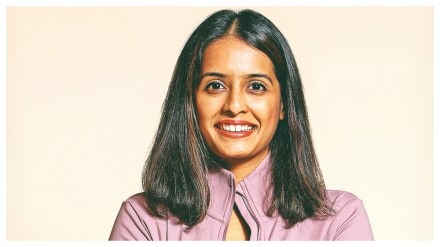The world of performance wear quietly transformed during the pandemic. What began as clothing made for workouts soon became the uniform of everyday life — for lounging, errands, and endless Zoom calls. Comfort became currency, and function met fashion in a new way. When Blissclub entered this space in December 2020, it didn’t come armed with a sprawling catalogue or a celebrity campaign. It had just one product — a pair of black leggings. Four sizes. A soft, stretchy, high-performance fabric that felt as easy as cotton but performed like synthetics should. That was enough to get the flywheel turning. Within months, Blissclub was clocking a crore in monthly revenue from that single stock keeping unit (SKU), recalls founder and CEO Minu Margeret.
But like most success stories, Blissclub’s didn’t begin with a business plan. It began with a life lived in motion. Margeret grew up constantly on the move, hopping cities and countries. Born in Mumbai, she spent her early years in Bahrain before returning to India for school and eventually settling in Bengaluru, her home for the last 17 years. Her career took shape through finance first. A B.Com degree, a stint at Chartered Accountancy, and five years across Goldman Sachs, Wipro, and Unilever in business finance roles.
After earning her MBA from ISB in 2017, she pivoted sharply toward brand building, joining AB InBev. Later, she moved to PhonePe just as the UPI story was beginning to unfold. There, she worked on some of the early category-defining marketing campaigns that helped PhonePe rise to the top of the country’s digital payments ecosystem. But by late 2019, something in her shifted. “I have been in Bengaluru for 17 years, which also means I have always been bitten by the startup bug in some way,” she told FE. The desire to build something from scratch became too strong to ignore.
She quit her job and began exploring different problem areas, like edtech, groceries, and eventually, activewear. The last one stayed with her because it was personal. Every time she travelled abroad, she bought activewear that actually performed in the sense that they were breathable, durable, and flattering. And almost every time, she would find the label read “Made in India”. It didn’t make sense. Why should Indians have to buy their own country’s craftsmanship from foreign brands?
That thought led to a deeper realisation. There wasn’t a single homegrown brand building performance clothing specifically for Indian women, their bodies, their weather, their movement patterns. And just as sneakers had moved from gym floors to everyday streets, activewear too was evolving into an all-day wardrobe. Margeret saw the opportunity to make that shift Indian.
Before launching the product, she built a community. In early 2020, when lockdowns had pushed everyone indoors, Blissclub was born as a movement, quite literally. Through Instagram and WhatsApp, Margeret and her small team hosted virtual fitness sessions like yoga, Zumba, functional training, even dance. It wasn’t marketing; it was belonging. Those women became the brand’s first buyers, its first advocates.
By December 2020, the first pair of leggings went live. The hero of the story was the fabric, named CloudSoft, developed after months of experimentation. Blissclub created a synthetic fabric with more than 20% spandex, engineered to feel like cotton because Indian consumers still equate comfort with cotton. “Synthetic fabric in India has always had a very low-quality connotation,” Margeret said. “But there’s an entire world of high-quality synthetics that India has never really experienced.”
As demand grew, the company began investing deeply in product design and research. It hired a fabric engineer, a fit technician, a sourcing head with decades of experience at Decathlon, and even a former Lululemon design lead. Each new fabric that Blissclub develops takes nearly a year from concept to finished product. “Right now, we are working on the 2027 collection,” she said.
Blissclub’s growth mirrored its philosophy of slow, steady, and focused on what moves women, literally. Margeret began with a few lakhs of personal savings, but the traction from her early customers drew investor attention.
In May 2021, Elevation Capital led Blissclub’s seed round, backing the idea that women’s activewear in India deserved better. Since then, the company has expanded its offerings, but stayed close to its roots. Today, Blissclub sells around 50 products, though just 20 account for most of its sales. The collection is grouped around movement, comprising activewear for workouts, citywear for work and commutes, and all-day
wear for travel and leisure.
Blissclub also understood early that for a new kind of fabric, touch and feel mattered. The brand began expanding offline, opening stores where customers could experience the product firsthand. The team today has around 80 people at its core and another 45 across stores. In FY25, Blissclub hit `130 crore in revenue, up from `87 crore the previous year, marking a 50% growth in operating revenue.
For Margeret, however, the story isn’t just about numbers or even fashion. It’s about movement in every sense of the word. Movement as freedom, as strength, as self-expression. “Our mission has always been to help women move better,” she said. “Not just in the gym, but through their day.”
